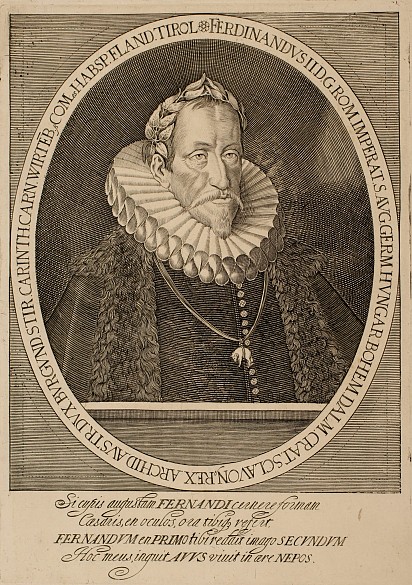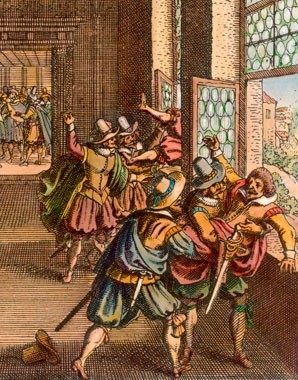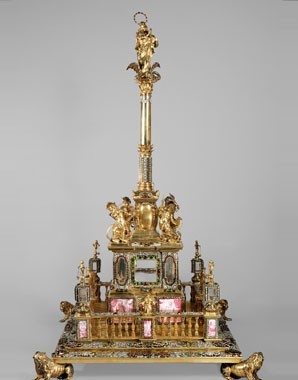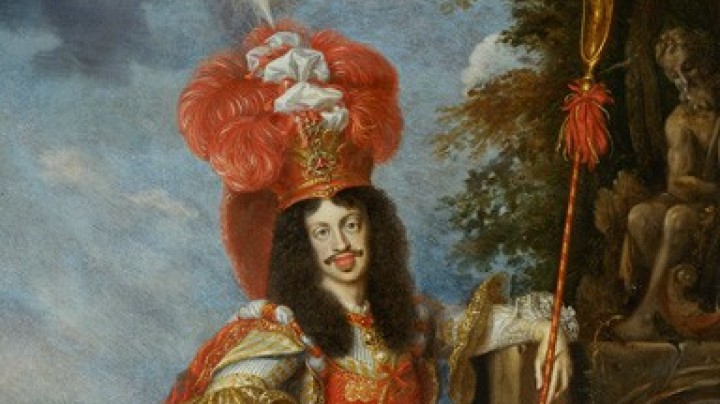Ferdinand II: the emperor metes out punishment
The victory gained in the Battle of the White Mountain at the gates of Prague encouraged Ferdinand in his uncompromising attitude. His rule was reinstated in Bohemia and the leaders of the revolt were publicly executed as a warning to others.
While the twenty-eight condemned leaders were being executed on the Old Town Square (Staroměstské náměstí) in Prague, the emperor was praying for their souls in Mariazell, a place of pilgrimage dedicated to the Virgin Mary in Upper Styria. This was wholly characteristic behaviour for Ferdinand, who saw himself as a benevolent monarch forced to take harsh measures by external circumstances.
The emperor saw Bohemia, which had rebelled against him, as a newly conquered territory which he could now proceed to transform in accordance with his ideas, without regard to tradition and privileges.
The body of legislation known as the Verneuerte Landesordnung (Revised Land Ordinance) imposed by Ferdinand in 1627 created the new legal basis for justice and administration in the Bohemian lands. It reinforced royal authority to exercise power, curtailed the powers of the Estates, established Catholicism as the only legal faith and made the Bohemian Crown heritable only by the House of Habsburg.
Another consequence was that the Catholic Counter Reformation now started in earnest. With the use of at times brutal measures non-Catholics – and these made up the overwhelming majority of the population in Bohemia – were intimidated, persecuted and suppressed. This resulted in an enormous population loss: almost 150,000 people left the country, with dire consequences for its economy and cultural life. The weakening of the Czech character of this region that went hand in hand with these measures led to this epoch having exclusively negative connotations in the nineteenth century during the time of nationalist resurgence, when it was referred to as ‘temno’, or the period of darkness. The events that took place after 1620 constitute the most important point of reference for anti-Habsburg, anti-Catholic and anti-German tendencies in Czech nationalist agitation.
The measures implemented by Ferdinand II put an end to the pronounced religious pluralism in the Bohemian lands. The Protestant nobility and the middle classes were ruined financially by confiscations. Massive land redistribution took place to the benefit of Catholic favourites and military commanders who were loyal to the emperor. Ferdinand bestowed these estates on the latter partly to offset debts that had been incurred through the war and partly out of gratitude, with the result that he was celebrated as a generous and munificent monarch. A more critical appraisal reveals that Ferdinand did nothing to hinder his loyal supporters engaging in ominous practices that plunged the Monarchy into a financial crisis. One of these was the debasement of the coinage. A consortium comprising the emperor’s most important political functionaries withdrew and reissued the coinage, enriching themselves in the process by reducing the precious metal content. The head of Ferdinand’s household and closest confidant, Prince Hans Ulrich von Eggenberg, as well as the imperial governor of Bohemia, Karl von Liechtenstein, a devious power politician, and above all Albrecht von Wallenstein, later the all-powerful military commander, made enormous profits by diverting imperial finances into their own pockets. Corruption and the purchase of offices and titles flourished at the Viennese court.
To a lesser extent the emperor’s punitive measures also affected Upper and Lower Austria. In the land above the Enns the situation worsened as rule over this territory had been ceded to Bavaria, in return for providing Ferdinand with massive military support and funding. Bavarian rule was aggravated by the rigorous implementation of counter-reformatory measures. These led to a revolt by the Protestant peasantry which was brutally suppressed in 1626.
Ferdinand’s aim of establishing the Catholic faith as the only denomination in the territories over which he held sway had now been achieved in the Austrian and Bohemian lands. Protestantism had been marginalized or made illegal. Although the practice of Protestant faith was to survive clandestinely, Catholicism was now the unchallenged and determining state religion. The Estates of the various lands had been robbed of their powers of resistance, in contrast to the section of the nobility loyal to the emperor, who with their financial position consolidated now enjoyed almost unlimited power over their bondsmen as local feudal overlords.
Within the Habsburg Monarchy Ferdinand II had thus succeeded in approximating the political and religious structures to the ideal of absolutist rule.
This absolutist ideology was also deployed with regard to the dynasty. In order to preclude future power struggles such as that waged between Rudolf and Matthias, Ferdinand introduced the principle of hereditary primogeniture in 1621. This meant that the first-born son automatically became head of the dynasty and that all other members of the family were subject to his authority.
In the historical literature there are conflicting assessments of Ferdinand, both as an individual and in terms of his achievements. On the one hand he is portrayed as a fanatical and brutal proponent of the Counter Reformation who was merciful to his enemies only when they had been wholly subjected to his power. Other historians emphasize his importance as a monarch who served unconditionally the cause of Catholicism and the continuation of the House of Habsburg, managing to transform the Habsburg Monarchy into a religiously uniform and politically stable power after the existential crisis it had undergone under his predecessors.
















